I need to write a SQL query in the CosmosDB query editor, that will fetch results from JSON documents stored in Collection, as per my requirement shown below
The example JSON
{
"id": "abcdabcd-1234-1234-1234-abcdabcdabcd",
"source": "Example",
"data": [
{
"Laptop": {
"New": "yes",
"Used": "no",
"backlight": "yes",
"warranty": "yes"
}
},
{
"Mobile": [
{
"order": 1,
"quantity": 2,
"price": 350,
"color": "Black",
"date": "07202019"
},
{
"order": 2,
"quantity": 1,
"price": 600,
"color": "White",
"date": "07202019"
}
]
},
{
"Accessories": [
{
"covers": "yes",
"cables": "few"
}
]
}
]
}
Requirement: SELECT 'warranty' (Laptop), 'quantity' (Mobile), 'color' (Mobile), 'cables' (Accessories) for a specific 'date' (for eg: 07202019)
I've tried the following query
SELECT
c.data[0].Laptop.warranty,
c.data[1].Mobile[0].quantity,
c.data[1].Mobile[0].color,
c.data[2].Accessories[0].cables
FROM c
WHERE ARRAY_CONTAINS(c.data[1].Mobile, {date : '07202019'}, true)
Original Output from above query:
[
{
"warranty": "yes",
"quantity": 2,
"color": "Black",
"cables": "few"
}
]
But how can I get this Expected Output, that has all order details in the array 'Mobile':
[
{
"warranty": "yes",
"quantity": 2,
"color": "Black",
"cables": "few"
},
{
"warranty": "yes",
"quantity": 1,
"color": "White",
"cables": "few"
}
]
Since I wrote c.data[1].Mobile[0].quantity i.e 'Mobile[0]' which is hard-coded, only one entry is returned in the output (i.e. the first one), but I want to have all the entries in the array to be listed out
